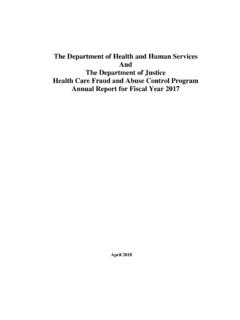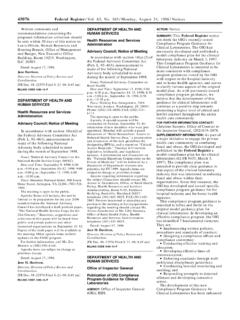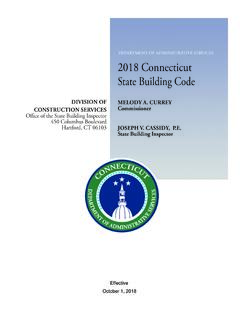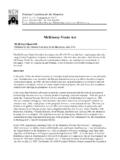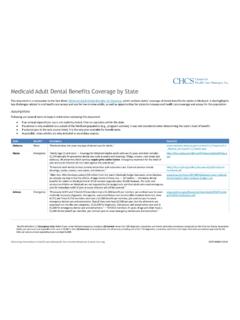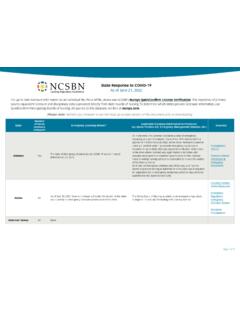Transcription of The Department of Health and Human Services (HHS), Office …
1 The Department of Health and Human Services (HHS), Office of Inspector General (OIG), provides independent and objective oversight that promotes economy, efficiency, and effectiveness in HHS programs and operations. OIG s program integrity and oversight activities are shaped by legislative and budgetary requirements and adhere to professional standards established by the Government Accountability Office (GAO), the Department of Justice (DOJ), and the Inspectors General community. OIG carries out its mission to protect the integrity of HHS programs and the Health and welfare of the people served by those programs through a nation-wide network of audits, investigations, and evaluations. The Administration for Community Living (ACL) serves as the Federal agency responsible for increasing access to community supports while focusing attention and resources on the unique needs of older Americans and people with disabilities across the lifespan.
2 ACL s mission is to maximize the independence, well-being, and Health of older adults, people with disabilities across the lifespan, and their families and caregivers. By funding Services and supports provided by networks of community-based organizations and with investments in research and innovation, ACL helps make this principle a reality for millions of Americans. The HHS Office for Civil Rights (OCR) is the Department s civil rights, conscience and religious freedom, and Health privacy rights law enforcement agency. OCR s disability nondiscrimination enforcement authorities include Section 504 of the Rehabilitation Act, Title II of the Americans with Disabilities Act, and Section 1557 of the Affordable Care Act. Group Home Beneficiaries Are at Risk of Serious Harm OIG found that Health and safety policies and procedures were not being followed. Failure to comply with these policies and procedures left group home beneficiaries at risk of serious harm.
3 These are not isolated incidents but a systemic problem 49 states had media reports of Health and safety problems in group homes. - i -A toolbox for better Health and safety outcomes in group homesModel Practices for State Incident Management and Investigation Model Practices for StateIncident Management AuditsModel Practices for State Mortality ReviewsModel Practices for State Quality Assurance Reporting and notification Incident review Investigation Corrective action and implementation Trend analysis Assess incident reporting Assess response and review of incidents Assess investigations Assess corrective actions Assess identification and response to incident trends Identify cause and circumstances of beneficiary death Where warranted, take corrective action Identify mortality trends Systemic responses and evaluation of their efficacy Reporting Oversight of service planning and delivery Periodic assessment of performance Review network capacity and accessibility Compliance monitoring of requirements and outcomesA Roadmap for states Compliance Oversight Model Practices JointReportEnsuring Beneficiary Health and Safety in Group Homes Through State Implementation of Comprehensive Compliance Oversight- ii - Objective: To determine if group homes complied with Federal and State requirements for reporting, recording, and detecting critical incidents in group homes Where we did the work: connecticut , Massachusetts, and Maine Finding: OIG found serious lapses in basic Health and safety practices in group homes.
4 Recommendations: connecticut , Massachusetts, and Maine should provide additional training, update policies and procedures, and provide access to Medicaid claims data. Referrals: OIG made multiple referrals to local law enforcement to address specific incidents of did not report to investigators two separate critical incidents. A resident suffered head lacerations while being restrained by the group home s aides. The resident required treatment at a local hospital s emergency room. Investigations were opened for both incidents based on information OIG did not report to investigators three separate critical incidents. A resident suffered from repeated head injuries that required treatment at a local hospital s emergency room. An immediate protective service order was issued for the beneficiary based on information OIG Group Home Health and Safety Work connecticut Did Not Comply With Federal and State Requirements for Critical Incidents Involving Developmentally Disabled Medicaid Beneficiaries (May 2016 A-01-14-00002) Massachusetts Did Not Comply With Federal and State Requirements for Critical Incidents Involving Developmentally Disabled Medicaid Beneficiaries (July 2016 A-01-14-00008) Maine Did Not Comply With Federal and State Requirements for Critical Incidents Involving Medicaid Beneficiaries With Developmental Disabilities (August 2017 A-01-16-00001) OIG Reports on Group Home Health and Safety Depth of expertise and multiple perspectives Developing a set of Model Practices that provide states with a roadmap for how to implement better Health and safety practices, many of which are already required Coordination with.
5 DOJ, CMS, State stakeholdersGovernment Partnership OIG, ACL, and OCR CMS SWAT Team Form a SWAT team to address systemic problems in State implementation and compliance with Health and safety oversightCMS GuidanceEncourage states to implement compliance oversight programs for group homes, such as the Model Practices, and regularly report to CMSCMS Take ActionTake immediate action in response to serious Health and safety findings in group homes, using authorities under 42 CFR (g) Joint Report Suggestions to CMS:100500 Critical Incidents Not Reportedto InvestigatorsCTMAME99%58%95% TABLE OF CONTENTS I. Executive Summary ..1 II. Background ..4 III. Key Components of Health and Safety Compliance IV. Conclusion ..15 V. Appendices A. Model Practices for State Incident Management and Investigation .. A-i B. Model Practices for Incident Management Audits .. B-i C. Model Practices for State Mortality Reviews .. C-i D. Model Practices for State Quality Assurance.
6 D-i E. Related HHS Reports and Activities .. E-i Joint Report: Ensuring Beneficiary Health and Safety in Group Homes Through State Implementation of Comprehensive Compliance Oversight 1 I. EXECUTIVE SUMMARY This joint report is issued by the Department of Health and Human Services , Office of Inspector General (OIG); Administration for Community Living (ACL); and Office for Civil Rights (OCR) to help improve the Health , safety, and respect for the civil rights of individuals living in group homes. The joint report provides suggested model practices to the Centers for Medicare & Medicaid Services (CMS) and states for comprehensive compliance oversight of group homes to help ensure better Health and safety outcomes. In addition, the Joint Report provides suggestions for how CMS can assist states when serious Health and safety issues arise that require immediate attention. In recent decades, the United states has seen a shift from institutional care settings to more community-based Services and supports.
7 This change is attributable to multiple factors, including a growing desire of individuals, including individuals with disabilities, to live and participate in typical communities; the increased flexibility and use of Medicaid funding for community-based, long-term Services and supports; and the implementation of the Supreme Court s Olmstead In addition, community-based settings, such as group homes, provide many individuals with greater independence, the choice to live in the community, and access to other opportunities. Access to Services that support community living is a key part of this transformation. Group homes and other residential settings that meet the requirements for home and community-based service provision as defined by the Department of Health and Human Services (HHS), CMS, are part of the spectrum of integrated options. However, individuals with developmental disabilities are at higher risk of abuse and neglect, particularly where they live (irrespective of residential setting type), and may have little or no access to police, support Services , or external In response to a congressional request concerning the number of deaths and cases of abuse of individuals with developmental disabilities residing in group homes, OIG performed reviews in four states .
8 The congressional request arose in part because of a 2012 1 In Olmstead v. , 527 581 (1999), the Supreme Court established that unjustified isolation is a form of discrimination under the Americans with Disabilities Act. 2 Christy J. Carroll, Efthalia Esser, and Tracey L. Abbott. State of the states on Abuse and Neglect of Individuals with Developmental Disabilities. North Dakota Center for Persons with Disabilities, Minot State University, 2010. Available at Accessed on October 18, 2017. See also OIG, Early Alert: The Centers for Medicare & Medicaid Services Has Inadequate Procedures To Ensure That Incidents of Potential Abuse or Neglect at Skilled Nursing Facilities Are Identified and Reported in Accordance With Applicable Requirements (A-01-17-00504). Available at Accessed on November 8, 2017. OIG identified 134 Medicare beneficiaries whose injuries may have been the result of potential abuse or neglect that occurred from January 1, 2015, through December 31, 2016.
9 OIG also found that a significant percentage of these incidents may not have been reported to law enforcement. 82 of the 1,361 deaths of individuals with developmental disabilities in connecticut involved suspected abuse or neglect. CT OPA Report (2012) Joint Report: Ensuring Beneficiary Health and Safety in Group Homes Through State Implementation of Comprehensive Compliance Oversight 2 report issued by the connecticut Office of Protection and Advocacy for Persons with Disabilities (OPA) that found that 82 of the 1,361 deaths state-wide of individuals with developmental disabilities from January 2004 through December 2010 involved suspected abuse or neglect. OPA investigated 81 of those deaths. The deaths involved individuals with injuries such as broken bones; safety issues such as choking incidents and burns associated with scalding; car accidents involving unlicensed drivers; and inadequate medical Services at private and public group homes, State training schools, regional centers, skilled nursing facilities, and hospitals.
10 Investigators cited abuse, neglect, and medical errors as contributing factors in these deaths. OIG s objective in its reviews was to identify instances in which the State agencies that administer the State Medicaid program did not comply with Federal waiver and State requirements for reporting and monitoring critical incidents involving Medicaid beneficiaries with developmental disabilities who reside in group homes. In OIG s audits of connecticut , Massachusetts, and Maine, the State agencies did not comply with Federal waiver and State requirements for reporting and monitoring critical incidents involving Medicaid beneficiaries with developmental disabilities. These audits found that these State agencies: failed to ensure that group homes reported all critical incidents, failed to ensure that all critical incidents reported by group homes were properly recorded, failed to ensure that group homes always reported incidents at the correct severity level, failed to ensure that all data on critical incidents were collected and reviewed, and failed to ensure that reasonable suspicions of abuse or neglect were properly reported.
